|
|
|
Sort Order |
|
|
|
Items / Page
|
|
|
|
|
|
|
| Srl | Item |
| 1 |
ID:
111912


|
|
|
|
|
| Publication |
2012.
|
| Summary/Abstract |
Drawing primarily on the experience of the UK since 2001, this article examines the increasing prevalence of risk as an organizing concept for western defence and security planning and its implications for civil-military relations and strategy-making. It argues that there may be tensions between such approaches and the principles of good strategy-making, which aim to link means and resources to ends in a coherent manner. Not only does risk potentially blur the relationship between means and ends in the strategy-making process, it also exposes it to contestation, with multiple interpretations of what the risks actually are and the strategic priority (and commitment) which should be attached to them. The article examines these tensions at three levels of risk contestation for British defence: institutions, operations and military-society relations. In the case of the UK, it contends that the logic of risk has not been able to provide the same national motivation and sense of strategic purpose as the logic of threat. In this context, calls for a reinvigoration of traditional strategy-making or a renewed conception of national interest may be missing a more fundamental dissonance between defence policy, civil-military relations and the wider security context. More widely, the strategic ennui that some western states have been accused of may not simply be a product of somehow falling out of the habit of strategy-making or an absence of 'political will'. Instead, it may reflect deeper social and geostrategic trends which constrain and complicate the use of military force and obscure its utility in the public imagination.
|
|
|
|
|
|
|
|
|
|
|
|
|
|
|
|
| 2 |
ID:
131435
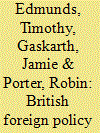

|
|
|
|
|
| Publication |
2014.
|
| Summary/Abstract |
In July 2013, Chatham House hosted a workshop under the auspices of the Global Insecurities Centre of the University of Bristol and the British Foreign Policy Working Group of the British International Studies Association, to explore these challenges. Four of the papers presented at that conference have been chosen for this special selection.
|
|
|
|
|
|
|
|
|
|
|
|
|
|
|
|
| 3 |
ID:
046261
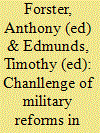

|
|
|
|
|
| Publication |
New York, Palgrave Macmillan, 2002.
|
| Description |
x, 260p.
|
| Standard Number |
0333946219
|
|
|
|
|
|
|
|
|
|
|
|
Copies: C:1/I:0,R:0,Q:0
Circulation
| Accession# | Call# | Current Location | Status | Policy | Location |
| 046294 | 355.30947/FOR 046294 | Main | On Shelf | General | |
|
|
|
|
| 4 |
ID:
064922
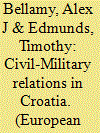

|
|
|
| 5 |
ID:
064918


|
|
|
| 6 |
ID:
064924
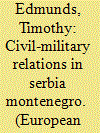

|
|
|
| 7 |
ID:
131437
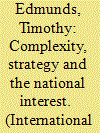

|
|
|
|
|
| Publication |
2014.
|
| Summary/Abstract |
British strategy-making has been subject to a sustained critique in recent years, from parliamentarians, retired members of the armed forces and scholars of strategic studies. This article examines the nature of this critique and the evolving character of strategic practice in Britain. It argues that the criticisms of British strategymaking are often misplaced, for two main reasons. First, many base their critique on a reductionist notion of unitary 'national interest' that fails to capture systemic patterns of complexity and contestation in the wider security environment and in Britain. Second, they underestimate or ignore the extent to which the UK strategic community is itself innovating in response to these themes, particularly since the 2010 Strategic Defence and Security Review. This is not to argue that considerable challenges do not remain for strategy-making in Britain. Most notably, these include: how to translate strategic innovation in departments and elsewhere into a coherent national strategic agenda; how to do this while maintaining institutional coordination and a shared sense of strategic purpose across government (and beyond); how to sustain and consolidate institutional expertise and experience in a rapidly changing civil service and at a time of continuing public austerity; and how to articulate and legitimate security policy decisions among a general public that is both disengaged from elite strategic discourse and sceptical of the efficacy of military force. Even so, the article concludes by arguing that it is possible to see the outline of an emergent and distinctive theory of action in contemporary British strategic practice, characterized by principles of adaptivity, anticipation, self-organisation and nascent cross-governmentalism.
|
|
|
|
|
|
|
|
|
|
|
|
|
|
|
|
| 8 |
ID:
095067


|
|
|
|
|
| Publication |
2010.
|
| Summary/Abstract |
The UK faces a pressing defence dilemma. The declaratory goals of defence policy are struggling to match the demands made by operational commitments and the financial and organizational capacities. The article examines how and why this situation has come about. While recognizing that existing calls for higher defence spending, reform of the Ministry of Defence, efficiency gains or a renewal of the so-called military covenant between the military and society may address discrete elements of the defence dilemma in Britain, it argues that current problems derive from a series of deeper tensions in the nexus of British defence more widely defined. These include a transnationalization of strategic practice, in ways that both shape and constrain the national defence policy process; the institutional politics of defence itself, which encourage different interpretations of interest and priority in the wider strategic context; and finally the changing status of defence in the wider polity, which introduces powerful veto points into the defence policy process itself. It argues that while a series of shocks may have destabilized existing policy, prompted ad hoc organizational adaptation in the armed forces and led to incremental cost saving measures from the government, a 'dominant crisis narrative'-in the form of a distinctive and generally agreed programme of change-has yet to emerge. The article concludes by looking forward to a future strategic defence review, highlighting the critical path dependencies and veto points which must be addressed if transformative change in British defence is to take place.
|
|
|
|
|
|
|
|
|
|
|
|
|
|
|
|
| 9 |
ID:
052686


|
|
|
|
|
| Publication |
London, International Institute for Strategic Studies, 2003.
|
| Description |
94p.
|
| Series |
Adelphi Paper; 360
|
| Standard Number |
0198530390
|
|
|
|
|
|
|
|
|
|
|
|
Copies: C:1/I:0,R:1,Q:0
Circulation
| Accession# | Call# | Current Location | Status | Policy | Location |
| 048286 | 355.0335497/EDM 048286 | Main | On Shelf | Reference books | |
|
|
|
|
| 10 |
ID:
181758


|
|
|
|
|
| Summary/Abstract |
2021 is a key moment of opportunity for UK maritime security. The publication of the government’s Integrated Review in March is being followed by a systematic ‘refresh’ of the UK’s 2014 National Strategy for Maritime Security. In this article, Christian Bueger, Timothy Edmunds and Scott Edwards examine the role and significance of this strategy refresh, consider key priority issues for enhancing maritime security, and reflect on the challenges and opportunities that policymakers will face turning strategy into action. They conclude by arguing that getting maritime security right will be critical to delivering on the UK’s ambitions in security and foreign policy more widely.
|
|
|
|
|
|
|
|
|
|
|
|
|
|
|
|
| 11 |
ID:
080944


|
|
|
|
|
| Publication |
2008.
|
| Summary/Abstract |
This article examines the reform of the Serbian intelligence agencies since the fall of Slobodan Miloevi and argues that they are important actors in democratisation, with a powerful capacity to influence and frustrate the reform process. However, the Serbian experience demonstrates that the role of intelligence agencies in democratisation is complex. In Serbia, governance of the intelligence sector has been characterised neither by a simple maximisation of civil power over the agencies themselves, nor by outright resistance to change by inherently compromised, authoritarian-era structures. Instead, the role and reform of Serbia's intelligence agencies since 2000 has been closely integrated with developments in the political sphere, and has exhibited considerable continuity with past practice
|
|
|
|
|
|
|
|
|
|
|
|
|
|
|
|
| 12 |
ID:
173915
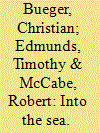

|
|
|
|
|
| Summary/Abstract |
Maritime security capacity-building is a growing field of international activity. It is an area that requires further study, as a field in its own right, but also as an archetype to develop insights for capacity-building and security sector reform in other arenas. This article is one of the first to analyse this field of activity. Our empirical focus is on the Western Indian Ocean (WIO) region. Here, international actors have launched multiple capacity-building projects, initially in response to Somali piracy. We document the significance, extent and variety of capacity-building activities in this region and examine the ways in which capacity-building at sea has incorporated innovative characteristics that develop and expand the capacity-building agenda as traditionally understood. Our conclusion highlights the need to pay more attention to the maritime domain in international security and development studies and considers ways in which the maritime capacity-building experience may offer important lessons for other fields of international policy.
|
|
|
|
|
|
|
|
|
|
|
|
|
|
|
|
| 13 |
ID:
065551


|
|
|
|
|
| Publication |
2003.
|
| Description |
p145-166
|
|
|
|
|
|
|
|
|
|
|
|
|
|
|
|
| 14 |
ID:
178873
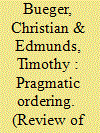

|
|
|
|
|
| Summary/Abstract |
The question of when and how international orders change remains a pertinent issue of International Relations theory. This article develops the model of pragmatic ordering to conceptualise change. The model of pragmatic ordering synthesises recent theoretical arguments for a focus on ordering advanced in-practice theory, pragmatist philosophy, and related approaches. It also integrates evidence from recent global governance research. We propose a five-stage model. According to the model, once a new problem emerges (problematisation), informality allows for experimenting with new practices and developing new knowledge (informalisation and experimentation). Once these experimental practices become codified, and survive contestation, they increasingly settle (codification) and are spread through learning and translation processes (consolidation). We draw on the rise of the maritime security agenda as a paradigmatic case and examine developments in the Western Indian Ocean region to illustrate each of these stages. The article draws attention to the substantial reorganisation of maritime space occurring over the past decade and offers an innovative approach for the study of orders and change.
|
|
|
|
|
|
|
|
|
|
|
|
|
|
|
|
| 15 |
ID:
144727


|
|
|
|
|
| Summary/Abstract |
In recent years, there has been a sharp growth in political and sociological interest in the British military. Set against the backdrop of the armed forces’ increasing presence in everyday life, alongside the organizations’ ongoing restructuring, the current paper focuses on the MoD’s problematic attempts to recruit 30,000 reservists by 2020; what has become known as the Future Reserves 2020 programme (FR2020). We argue that these changes are driven in part by the need to cut costs in defence. However, we also suggest that they are a reflection of the changing nature of modern military organisation, and the manner in which armed forces engage with the societies of which they are a part, and with the citizens that make up that society. We locate FR2020 programme in the context of a wider narrative about the changing nature of military organisation in contemporary western democracies, identifying structural, circumstantial and normative reasons for change. We also examine the specific challenges of implementing FR2020 in practice, including issues of recruitment and retention, integration and support, and relations with families and employers, drawing on the experience of comparator countries to do so. We conclude by considering the implications of these changes, both for the future of UK armed forces, and for the evolving nature of military-society relations in Britain.
|
|
|
|
|
|
|
|
|
|
|
|
|
|
|
|
| 16 |
ID:
051824


|
|
|
| 17 |
ID:
075435
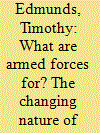

|
|
|
|
|
|
|
|